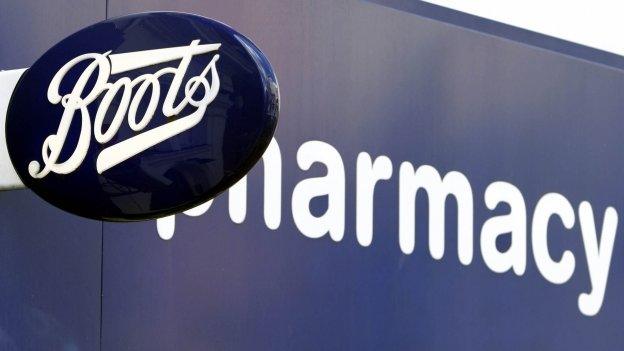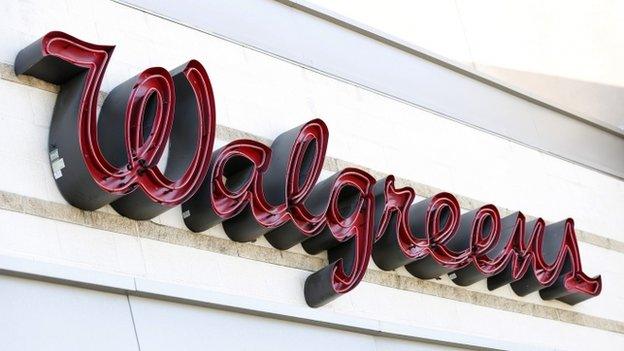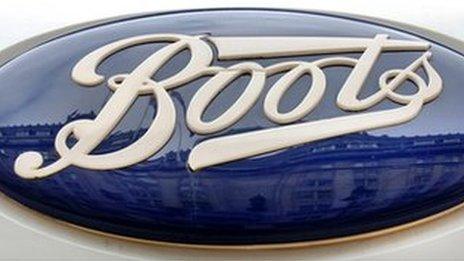Walgreens to buy up Alliance Boots
- Published

Walgreens bought a 45% stake in the company in 2012, and now wants to buy the remaining 55% stake
High Street chemist Alliance Boots is to be bought up by US pharmacy giant Walgreens.
The board of Walgreens will now seek shareholder approval for the £9bn deal to go through.
Walgreens bought a 45% stake in the company in 2012 and now wants to buy, external the remaining 55% stake.
The firm said it would not use the deal to alter its current tax structure, and expects the merged company to be based in Chicago.
Boots will remain at its UK headquarters in Nottingham.
Cost reductions
The pharmacy chain has long been a mainstay of the UK retail scene, with 2,487 stores across the country.
It employs more than 60,000 people in the UK, including more than 6,500 pharmacists.
The impact of the buy-out on jobs is not yet clear.
Walgreens has said it will look to make cost reductions of $1bn over three years at "corporate, field and store-level" across all of its businesses.
However, it will also invest "across core businesses at suitable returns to drive organic growth".
Walgreens shares slumped 14% on the New York Stock Exchange on Wednesday.
Investors had expected the firm to move its headquarters abroad in order to cut its tax bill.
"We are excited to move forward with the next important step in becoming a new kind of global health care leader," said Walgreens chief executive Greg Wasson.
The new combined company will be called "Walgreens Boots Alliance", and its headquarters will be in the Chicago area, Walgreens said.
Mr Wasson will become chief executive of the new company, and Stefano Pessina, who is currently executive chairman of Alliance Boots, will report to Mr Wasson.
Walgreens, which started out in Chicago in 1901, had 248,000 employees in 2013.
It has 8,231 shops across all 50 US states and the federal District of Columbia, Puerto Rico, Guam and the US Virgin Islands.
Tax plan ditched
Walgreens said it had thoroughly evaluated moving its headquarters abroad for tax purposes, but that the move would not have been feasible under current US tax rules.
A move would have put it at too much risk from scrutiny by the US tax authority, the Internal Revenue Service (IRS), the company said.
"We took into account all factors, including that we could not arrive at a structure that provided the company and our board with the requisite level of confidence that a transaction of this significance would need to withstand extensive IRS review and scrutiny," Mr Wasson said.
In addition, public opinion may have been against a move for tax purposes, the company added.
In May, pharmaceutical company Pfizer dropped a bid for UK company AstraZeneca following an outcry that it was partly motivated by a wish to buy the firm for tax reasons.
Being domiciled abroad is attractive for US companies because of the relatively high rate of US corporation tax compared with other countries.

US consumers are used to dozens of choices for the same basic drugs, like ibuprofen and cough medicine

Analysis
Kim Gittleson, BBC business reporter, New York
The first time I walked into a Boots in London, I was in search of something to soothe a scratchy throat - British dampness having taken its toll.
I scouted the shelves, only to be perplexed when there seemed to be just a handful of lozenges on offer. Could there really just be two generic brands for sale - not the dozens I was used to seeing on US pharmacy shelves?
This is not an uncommon experience for many Americans - and it is one reason why Walgreens, the US pharmacy chain that just snapped up Boots and its Swiss counterpart, distributor Alliance, does not seem to be interested in importing the Boots model wholesale to the US.
Rather, the company will test US appetites for British generics by importing a select few Boots brands, such as No7 and Botanics, to its US outlets, which include the Duane Reade pharmacy chain in New York.
In this way, it may avoid the disappointments so many other British imports have suffered - Tesco's recent effort with its Fresh & Easy chain of supermarkets comes to mind - while still taking advantage of the penchant that US consumers have for trying something new.

- Published6 August 2014

- Published6 May 2014

- Published2 May 2014

- Published19 June 2012
